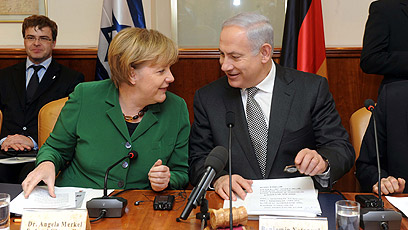

In a joint press conference with visiting German Chancellor Angela Merkel on Monday, Prime Minister Benjamin Netanyahu said Israel will work towards achieving peace with the Palestinians, but stressed that the sides must "sit together and try to resolve the difficult and complex conflict."
Netanyahu also lauded Berlin's "consistent stance" against Iran's nuclear program.
"Abu Mazen (Palestinian President Mahmoud Abbas) is 10 minutes from here – in Ramallah. I can go to him and he can come to me. At the end of the day there is no other way to secure peace," the PM said.
"Of course we want to ensure stability in the region so that this peace will be able to take root."
Addressing the uprising in Egypt, Netanyahu told reporters in Jerusalem that Israel was following the developments with "concern and vigilance, in the hope that peace, stability and security will be maintained."
He noted that the uprising in Egypt is not being led by radical Islam, but added, "In a state of chaos, an organized Islamist element can take over countries. It happened in Iran."
Merkel said Berlin did not "abandon" Cairo. "We cannot set a double standard and say that western principles apply only to some countries. I spoke on the phone with President Hosni Mubarak and told him what I think needs to be done – pursue dialogue with non-violent protestors who want to negotiate with the regime," she said.
During his meeting with Merkel, Netanyahu called to tighten sanctions against Iran and said all options remain on the table. "I told the chancellor that over the past 16 years there has only been one year in which Iran suspended its nuclear program, and that was when (Iran) believed the US would resort to the other option. That was in 2003," the PM told reporters.
Merkel agreed, saying Iran's nuclear program "poses a threat to Israel and the entire world. Germany took the necessary measures to toughen the sanctions, and we will continue doing so at the European Union in the coming weeks."

'Economic sanctions not enough.' Merkel and PM (Photo: Avi Ohayon, GPO)
The German leader also addressed the stalled peace talks, saying "from my perspective, the negotiations should commence as soon as possible." She added that Jewish settlements in the West Bank "cannot go hand in hand with the process and they are hindering negotiations."
Netanyahu said in response, "The conflict is not about the (West Bank) settlements; it is about the settlements called Tel Aviv, Haifa, Jaffa. This is why we expect that as part of a permanent agreement the head of the Palestinian Authority will come out and say 'the conflict is over; we recognize a Jewish state and the end of the conflict.' The (Palestinian) refugees will not pour into the State of Israel."
Earlier Monday, during a special joint session of Israeli and German ministers highlighting the two nations' strong bond six decades after the Holocaust, Merkel said, "We have similar values, and this makes it easy for us to cooperate."
Netanyahu said during the meeting, "We are allies and have a strong desire to bolster relations and cooperation between the countries, as well as a strong desire to promote peace and security in our region."
Addressing Iran's nuclear program, the PM said, "Economic sanctions are not enough. There must be a military threat at the end of the tunnel to increase the effectiveness."
Ronen Medzini and Attila Somfalvi contributed to the report
- Follow Ynetnews on Facebook















